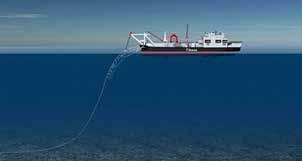
Gas prices surged after Russia was suspected of sabotaging an undersea gas pipeline between Finland and Estonia.
On Tuesday, Sauli Niinistö, the president of Findland, said that the 48 mile-long Balticconnector link between the two Nato allies has been extensively damaged by “external activity”.

“It is likely that damage to both the gas pipeline and the communication cable is the result of external activity,” he said in a statement.
The pipe’s shutdown prompted international gas prices to surge to their highest level since June, as Israel also shut a key production field.

Wholesale UK gas prices jumped by as much as 14 per cent on Tuesday, to more than 125 pence per therm, after having dropped as low 88p on Friday.
Simple malfunction being ruled out
The damage fuelled speculation that Russia was behind an attack on the connector, with Moscow previously threatening repercussions for Finland’s decision to join the Nato military alliance.
Finnish representatives in Brussels told their allies that an investigation was underway but the cause of damage was not yet clear.
Helsinki informed a meeting of Nato’s North Atlantic Council that the pipeline had either been damaged in an act of deliberate sabotage or accidental damage.
Its officials ruled out a simple malfunction, sources told The Telegraph
But the Nato member state, which joined in April in response to Russia’s invasion of Ukraine, sought to calm nerves by pointing out that 90 per cent of undersea cables or pipelines are damaged by fishing vessels.
The Finnish gas system operator Gasgrid said the pipeline could take months or more to repair.
The pipeline between Inkoo in Finland and Paldiski in Estonia crosses the Gulf of Finland, an arm of the Baltic Sea that stretches eastwards into Russian waters as far as St Petersburg.
“It seems that the Finnish defence forces and senior figures in the government strongly suspect it was Russia,” Charly Salonius-Pasternak, a security and defence expert, told The Telegraph.
“Who would have an interest in sabotaging the pipeline? There are really not a lot of countries that have the capabilities and motivation to do this. There’s basically just one,” he said.
, the secretary-general of Nato, said he had spoken to Mr Niinistö about ”damage to undersea infrastructure”.
He used a post on X, formerly known as Twitter, to write:
The pipeline incident was likely to be put on the agenda for a Nato defence ministers meeting in Brussels on Wednesday and Thursday.
A Nato source said the Finns were unlikely to trigger Article 5, the alliance’s collective defence clause.
The potential sabotage attack will revive memories of the Nord Stream gas pipelines between Germany and Russia in the Baltic Sea, which in September last year were hit by underwater explosions in what appeared to be sabotage.
The attack on the Nord Stream 1 and Nord Stream 2 pipelines took place in international waters, with large amounts of gas rising up from the ocean floor.
The cause of the explosions remains unclear. The attack has variously been blamed on Russia, Ukraine and the US, but all have denied involvement.https://cf-particle-html.eip.telegraph.co.uk/6e9593da-433c-4eea-848f-92f9b79cfa87.html?direct=true&id=6e9593da-433c-4eea-848f-92f9b79cfa87&truncated=true&expandable=false
The Balticconnector pipeline started commercial operations at the beginning of 2020.
Kai Mykkänen, Finland’s minister of climate and the environment, had earlier said that the state of the Nordic country’s gas supply remains stable despite the disruption of the pipeline that enables gas deliveries from Finland to the three Baltic states – Estonia, Latvia, Lithuania – and vice versa.
“The failure of the Balticconnector does not cause immediate problems for the security of energy supply. The causes of the pipe damage are being investigated and further actions will depend on them,” he said in a statement.
At the same time, escalating conflict in Israel following the terrorist attack by Hamas on Saturday has raised fears over the future of gas supply from the Middle East.
On Monday, Israel told Chevron to suspend production at its Tamar gas field, which is within range of Hamas rockets in Gaza. The Tamar field produces around 1.5 per cent of global liquified natural gas (LNG), according to Goldman Sachs.
There are also growing worries about the nearby Suez Canal, which is a major shipping route for LNG to Europe.
Gas remains far cheaper than it was last year, with wholesale prices peaking above 600p a therm last September. However, cold weather in the coming months could trigger a further jump in costs.
